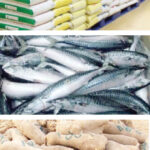Nigerians may have to brace up for an inevitable food crisis in the next few months if nothing strategic is done to absorb the impact of the current high food prices and most importantly, the high cost of fertiliser.
The cost of fertiliser today has skyrocketed with a bag of NPK and Urea fertiliser costing over N20,000 in the retail market. These are the two major fertiliser products being used by farmers, particularly for the cultivation of cereals like rice, and maize. For instance, one hectare of rice farm requires four bags of NPK and two bags of Urea fertiliser. The total average cost of the fertiliser needed for a hectare of rice farm is N120,000. This is aside from other costs like agrochemicals, labour, and other inputs.
- Tinubu distributes rice, sugar to over 50,000 families
- Eid: The unending controversy over moon sighting
Nigeria’s fertiliser use today is just about 19kg per hectare which is already far lower than the global average of over 100 kg per hectare. Consequently, per hectare productivity is also low when compared with other countries even in Africa.
As noted by many stakeholders, due to human activities such as over-cultivation of a particular piece of land and the consequences of climate change, soils are no longer as fertile as they used to be. Therefore, mineral fertilisers are used to supplement the soil’s nutrient stocks with minerals that can be quickly absorbed and used by crops.
Given the importance of fertiliser to Nigeria’s agricultural productivity, the federal government had created many initiatives to ensure the availability of fertiliser to farmers.
One of the several initiatives was the Presidential Fertiliser Initiative (PFI), an agreement signed in 2016 between President Muhammadu Buhari and the King of Morocco to support the blending of NPK fertiliser. The core of the PFI was for a state-owned Moroccan company and a world leader in phosphate and its derivatives to supply discounted phosphate to Nigeria, to help support the domestic blending of NPK fertiliser. In reality, the PFI supported an input subsidy regime that allowed the finished products to be delivered to Nigeria’s farmers at a starting price of about N5,500 per bag, compared to the N8,000 – N9,000 cost of imported fertiliser as of 2018-19. Also, before the implementation of the PFI, only 10 percent of the production capacities of the five blending plants in operation across the country were being utilised. However, during the PFI, many blending plants across the country were revived and new ones were born. Although farmers did not get the fertiliser at exactly N5,500, the cost of the PFI fertiliser was relatively lower in the open market. A few years down the line, it appears that the federal government has abandoned the PFI.
Information gathered suggests that the federal government is no longer implementing the PFI as it used to be where the blending plants blended for the government, but has liberalised the process such that the federal government through the Nigerian Sovereign Investment Authority (NSIA) imports phosphates and its derivatives from Morocco for interested blending plants. So, given the rate of depreciation of the naira against the dollar, the earlier subsidised cost is no longer translating as a significantly reduced cost in naira. Secondly, Muriate of Potash (MOP) which is a major raw material for blending NPK fertiliser sourced from Europe (majorly Russia, Ukraine, and Belarus) is now scarce, because of the war in the region and sanctions on Russia.
As it stands, experts have predicted low yield and poor harvest for the 2022 farming season, and the implication of that is a looming food crisis.
The government and other stakeholders must act fast to ensure that Nigeria does not further slide into a worse food crisis. In the short run, the federal government needs to revisit the PFI and quickly intervene in the importation of raw materials for the fertiliser blending plants. Going forward, there is the need to consider a fertiliser subsidy regime for farmers for the 2022 farming season. Thirdly, the federal government may have to consider strengthening the capacity of blending plants through the creation of a dedicated fund that fertiliser producers can access at a low-interest rate for the production of fertiliser. Finally, other options for the importation of the needed raw materials must be explored as a way to absorb the current scarcity of basic raw materials.
Godswill Aguiyi can be reached through [email protected]
 Join Daily Trust WhatsApp Community For Quick Access To News and Happenings Around You.
Join Daily Trust WhatsApp Community For Quick Access To News and Happenings Around You.


